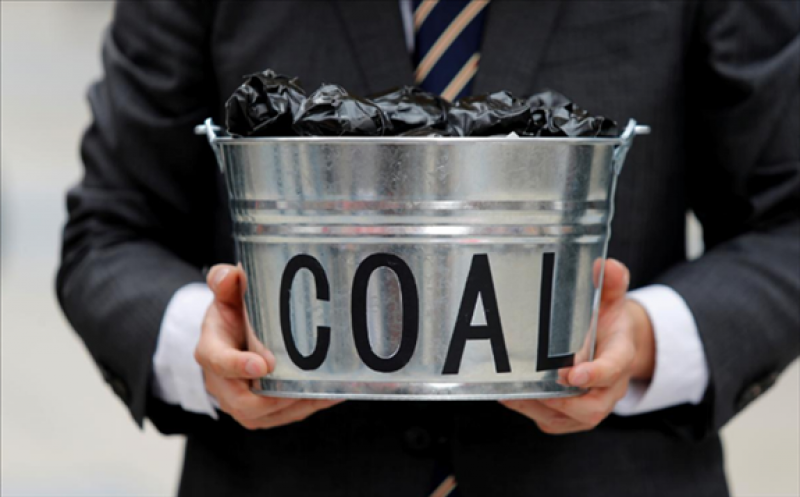LONDON (Reuters) - Some of Europe’s biggest banks are being challenged by environmental groups to sever all lending to utilities which they say are still developing new coal-fired power plants.
 FILE PHOTO: A protester holds a bucket of coal during a demonstration demanding Japan stops supporting coal at home and overseas, at the G20 Summit in Osaka, Japan, June 28, 2019
FILE PHOTO: A protester holds a bucket of coal during a demonstration demanding Japan stops supporting coal at home and overseas, at the G20 Summit in Osaka, Japan, June 28, 2019
The call comes as some 190 countries meet in Madrid to assess progress on the 2015 Paris Climate Agreement, which demands a virtual end to coal power by 2050.
A United Nations report last year said almost all coal-fired power plants would need to close by the middle of this century to curb a rise in global temperatures to 1.5 degrees Celsius, in line with the level scientists say is needed to stave off the worst effects of climate change.
“Some banks have pledged to not directly finance new coal plants but they are providing general finance to companies which are building new plants,” Katrin Ganswindt of German environmental pressure group Urgewald told Reuters.
Urgewald and BankTrack, an NGO focused on banks and the activities they finance, said an analysis of the 10 most active European lenders to companies which are still planning or developing new coal plants indicated total debt funding had risen to $56 billion between 2017 and the end of September 2019.
This compared with a calculation of $48 billion for the period 2014 to 2016, the pressure groups said in a report provided to Reuters on Thursday.
The 10 banks were Barclays, BNP Paribas, Credit Agricole, Credit Suisse, Deutsche Bank, HSBC, ING, Nordea, Standard Chartered and UniCredit.
Most of those named said the report did not reflect their efforts to stop funding coal plant development or a commitment to lowering carbon emissions. Credit Suisse declined to comment.
Britain’s Barclays said it no longer provides project finance to any new coal-fired power plants or expansions of existing ones and disagreed with some of the data:
“The report misrepresents and does not differentiate cases where Barclays finances a subsidiary investing in renewable energy, when its parent company may have other subsidiaries involved in coal, which have no relationship with Barclays.”
BANK ACTION
Since Paris, many European banks have adopted policies such as cutting lending to firms which rely on coal for a high percentage of their revenues or pledging to end funding for new mines.
Last week UniCredit said it would halt all lending for thermal coal financing by 2023, while BNP Paribas said this month it would stop financing the thermal coal sector in the European Union by 2030 and by 2040 worldwide.
Deutsche Bank said that since 2016 it no longer finances “directly or indirectly the construction of new coal-fired power plants or new mining projects for the production of steam coal”.
Some banks have increased their funding of renewable energy projects and stepped up engagement with clients to encourage a faster shift away from coal production and consumption.
“In a majority of cases we know the use of funds and are able to do our due diligence to make sure the financing is compatible with our policies, which include no direct financing for new coal-fired power plants,” Standard Chartered said.
Urgewald and BankTrack said their analysis was based on financial databases and public disclosures of loans obtained by 258 coal power producers and the underwriting of bonds issued by them, although for some syndicated loans and bond commitments the analysis had estimated each bank’s share.
Dutch bank ING said it did not “recognize the figures mentioned by Urgewald and the conclusions drawn from them”.
“ING supports new clients in the utilities sector only when their reliance on coal is 10% percent or less and they have a strategy to reduce their coal percentage to close to zero by 2025,” it added.